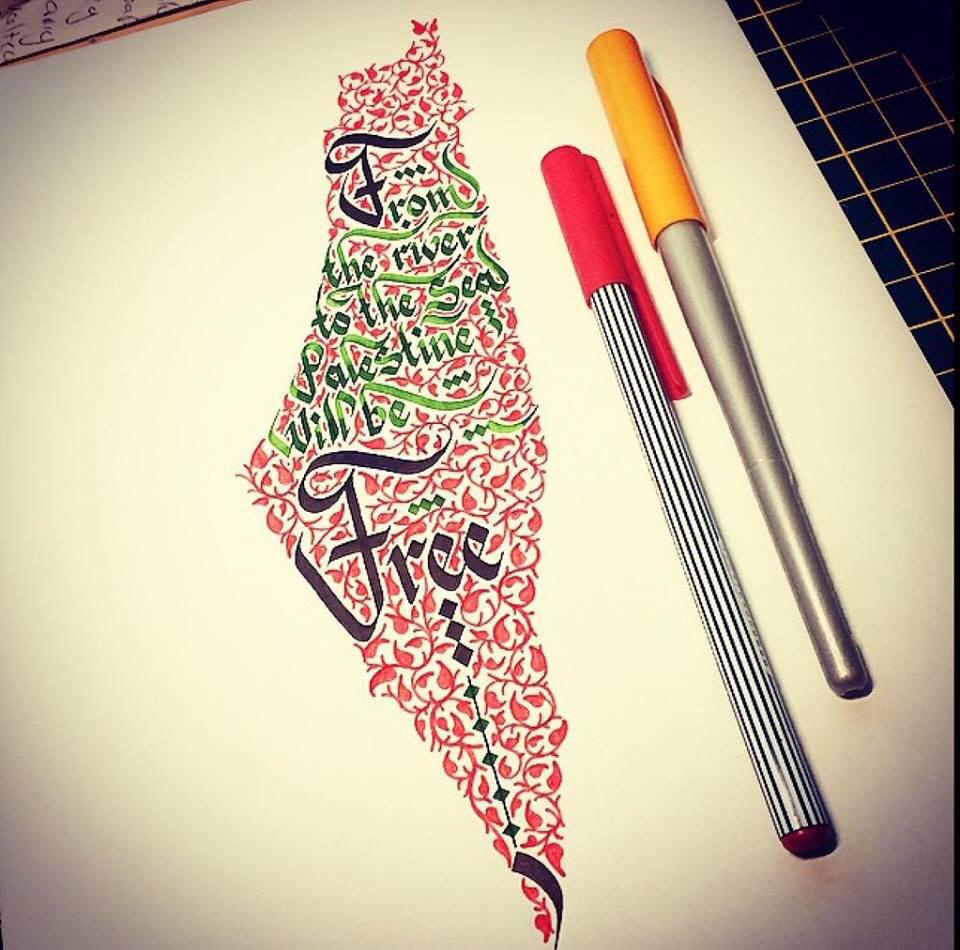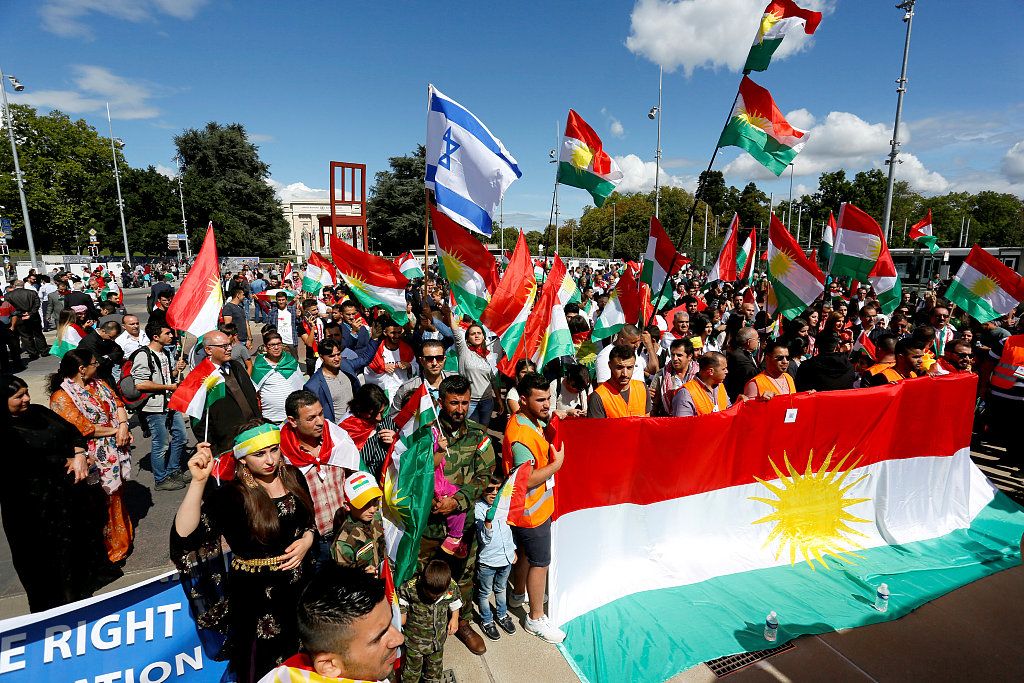Hypocrisy: A state for the Palestinians but not for the Kurds or Catalonia |Anne’s Opinions, 2nd October 2017
The Kurds are a nation scattered across the Middle East while their national territory was divided up by the ruling powers of a century ago and split amongst several nations, all in a manner similar to the fate of the Jews and Israel:
For decades, Kurdish politics have hinged on dreams of an independent Kurdish state. When colonial powers drew the map of the Middle East after World War I, the Kurds, who now number around 30 million, were divided among Turkey, Iran, Syria and Iraq.
Since the Arab “spring” with its multiple civil wars broke out, the Kurds are the one nation that have managed to remain united and hold on tot their territory, retaking control and a semblance of independence after decades of repression by the Arab countries who previously controlled their territory. They have been amongst the prime fighters against ISIS and have stayed out of the Israeli-Arab conflict altogether.In fact Israel is very popular with the Kurds and as I have previously written, the Israeli flag is a common sight at Kurdish rallies.
Last week the Kurds held a referendum amongst its people asking if they wanted independence. The answer of course was a resounding yes. However the answer from almost the entire world (the UN, the US, Iran, Iraq, Turkey) was a resounding “no”, or a hostile neutral silence. The only country that lent its solid support to the Kurdish nation was Israel.
Iraq threatened the Kurds with a flight ban if they do not hand over their airports to the Iraqi authorities:
Prime Minister Haider al-Abadi issued his ultimatum a day after the landmark vote, which he said was a “historic and strategic mistake by the Kurdish leadership.”
“I will not give up on the unity of Iraq, that is my national and constitutional duty,” he said, adding that any ban would still allow for humanitarian and other “urgent” flights.
That’s rich coming from the leader of a country which is so fractured that it barely exists any more.
Masoud Barzani, the Kurdish regional president who spearheaded the referendum, called for “dialogue” with Baghdad. “Negotiations are the right path to solve the problems, not threats or the language of force,” he said in a televised address.
The US remained cool to downright cold, refusing to recognize “illegitimate referendum“:
U.S. Secretary of State Rex Tillerson referred to the recent referendum on the independence of Kurdistan as “unilateral,” saying the vote held on September 25 lacks legitimacy.
“The United States does not recognize the Kurdistan Regional Government’s unilateral referendum held on Monday,” Tillerson said in a written statement on Friday (September 29).
Tillerson said his country supports a united, federal, democratic and prosperous Iraq.
He expressed concern over the possible “negative consequences” of the Kurdish referendum, adding the vote may hinder efforts to promote stability and prosperity for the people of the Kurdistan Region.
Tillerson said the U.S. asks all parties, including Iraq’s neighbors, to reject unilateral actions and the use of force.
“We urge calm and an end to vocal recriminations and threats of reciprocal actions. We urge Iraqi Kurdish authorities to respect the constitutionally-mandated role of the central government and we call upon the central government to reject threats or even allusion to possible use of force.”
But an interesting article in the New York Times of all places praised Israel’s endorsement of the Kurds’ bid for independence:
JERUSALEM — With a two-sentence statement supporting the Iraqi Kurds’ plan to hold a referendum on independence this Monday, Prime Minister Benjamin Netanyahu put Israel at odds with nearly every other major player in the Middle East.
Mr. Netanyahu, who endorsed not only the referendum but also the establishment of a Kurdish state, had ample strategic reason: A breakaway Kurdistan could prove valuable to Israel against Iran, which has oppressed its own Kurdish population.
But given the interwoven history and shared emotion underlying his statement, present-day geopolitics can seem almost beside the point.
The Kurds and the Jews, it turns out, go way back.
Back past the Babylonian Captivity, in fact: The first Jews in Kurdistan, tradition holds, were among the last tribes of Israel, taken from their land in the eighth century B.C. They liked it there so much that when Cyrus the Great of Persia conquered the Babylonians and let the Jews go back home, many chose instead to stick around.
Sixteen centuries later, Saladin, a Kurd, treated the Jews humanely after he conquered Jerusalem, and notably hired a Jewish doctor, Maimonides, as his physician.
In the modern era, Kurdish Jews departed en masse for Israel when the Jewish state was created in 1948, leaving Kurdish civil society so bereft that some recall its leaders still lamenting the Jewish exodus decades later.Ties between the two have only grown warmer and more vital since the 1960s, as Israel and the Kurds — both minorities in an inhospitable region and ever in need of international allies — have repeatedly come to each other’s aid. The Kurds have long patterned their lobbying efforts in Washington on those of Israel’s supporters.
Israeli flags often appear at Kurdish rallies, like this one in Erbil, Iraq
And while Kurdish leaders have not publicly embraced Israel in the run-up to the referendum, for fear of antagonizing the Arab world, the Israeli flag can routinely be seen at Kurdish rallies in Erbil and across Europe.
The Kurds in turn have friends and supporters all across Israel, including some 200,000 Kurdish Jews. But 83-year-old Tzuri Sagi, a retired brigadier general, has more reason than most Israelis to root for Kurdish independence.
Read the rest of that fascinating article about the ties between Israel and the Kurds.
A Jerusalem Post article also agrees with the Israeli position of supporting the Kurds bid for independence:
In the wake of Iranian aggression across the Middle East, the most effective strategy Israel can adopt is to recognize an independent Kurdistan and fully support it.
Across the Middle East Israel faces a variety of security threats, from Hezbollah in Lebanon and Assad’s regime in Syria to Hamas in the Gaza Strip and Islamic State (ISIS) in the Sinai Peninsula. These already existing threats are exasperated by Iran seeking to establish a Shi’ite Crescent from the Persian Gulf to the Mediterranean Sea and the Red Sea.
…
To prop up Assad’s regime and Hezbollah, Iran needs territorial contiguity from Iran to Iraq, Syria and Lebanon. This way, it can import supplies with ease to its proxies via land routes, for Israel has already demonstrated that it can infiltrate and stop Iranian sea or air shipments more easily. However, an independent Kurdistan in Syria and Iraq would territorially break up the Shi’ite Crescent, thus making it more difficult for Iran to carry out its terrorist activities across the Middle East. The Kurdistan region of Iraq led by President Masoud Barzani’s government will not permit Iranian shipments to terrorist groups to pass through its territory.
If Kurdistan becomes a full-fledged independent state in Northern Iraq and parts of Syria, the logistical obstacles for Iran will greatly increase.
It is not only for the purely practical geopolitical advantages that Israel should support the Kurds, but because it is morally right:
It is critical to note that Israel should support an independent Kurdistan because it is the moral thing to do. The Kurds were promised a country in the Treaty of Sevres but this promise was reneged on in the Treaty of Lausanne, leaving the Kurds as the largest nation on earth without a country, a reality that affects 40 million people. The Kurds have their own unique culture, history and language, which are distinct from those of their Turkish, Persian and Arab neighbors. Furthermore, in the past the Kurds had strong leaders who befriended the Jewish People, such as Saladin.
In addition, the Kurds ruled themselves in the past, under the Ayyubid dynasty and the Bohtan Emirate, to name a few. In fact, they were only absorbed by the Ottoman Empire in 1908. For this reason, the Kurds have a strong sense of nationalism.
The Kurds passionately believe that their culture, language and historic destiny can be best realized by granting them the same rights that other nations possess.
Israel’s former Ambassador to the UN, Ron Prosor also praises the Kurds’ readiness for statehood (unlike, say, the Palestinians):
An independent Kurdish state would be a victory for democratic values, national self-determination and the rights of women and minorities. Is there a more iconic image of the fight against the Islamic State than that of female Kurdish peshmerga fighters doing battle on the front lines against jihadists who demand the subjugation of women? An independent Kurdish state would empower these warriors in a part of the world where women and girls are typically second-class citizens.
In addition to its commitment to gender equality, Kurdistan has also shown its commitment to minority rights. Over the past three years, Kurdistan, which is about the size of Maryland, has taken in nearly two million refugees, including Assyrians, Yazidis, Turkmen, Shabaks and Christians fleeing the Islamic State and sectarian violence in other parts of Iraq and in Syria.
Even without a formal state, the Kurds have built a society that meets many of the criteria of statehood. They are economically viable, with a well-developed energy industry. They have functioning institutions, including elections for Parliament and a relatively free media. And they’ve proved capable of defending themselves against the Islamic State without attacking others.
Kurdistan is already, in values and governance, a democratic nation in waiting. Is it a perfect Jeffersonian democracy? No. Does it have a long way to go? Yes. But in a region where tyranny is the norm, it’s on the right track.
We should all pray that Kurds are successful in their bid for independence and that there will be a peaceful solution to this brewing crisis. Israel should certainly give it as much support as it can. And shame on the world for denying this brave, big-hearted people their rightful claim to their own territory and self-determination.
Meanwhile over in Spain, Catalonians held a referendum today asking their people if they wanted independence. The answer was not clear. Nevertheless the Spanish rejected the referendum, calling it illegal, and sent in the riot police which violently repressed the independence rallies, injuring almost 500 people:
Nearly 500 people were injured Sunday as Spanish security forces attempted to shut down a referendum vote on the future of the northeastern Spanish province of Spain.
Catalonia, a semi-autonomous province with its own official language, held the controversial vote Sunday on whether to remain a part of the Kingdom of Spain, or to seek independence.
Catalan President Carles Puigdemont, who supports a Catalan separation from Spain, said earlier that if the referendum saw a majority of “yes” votes, he would declare an independent Catalonia within 48 hours.
While polls show some 60% of locals oppose independence from Spain, a wide majority back the plebiscite.
Girls stroll through the center of Figueras with the Spanish and a pro-independence ‘Estelada’ Catalan flag
The Spanish government, however, has declared the referendum illegal and ordered security forces to bar voters from entering polling stations.
“There has not been a referendum or anything remotely similar,” Spanish Deputy Prime Minister Soraya Sáenz de Santamaría said.
In polling places across Catalonia, including the local capital, Barcelona, police clashed with crowds of voters as they attempted to enter voting stations.
During the clashes, officers opened fire with rubber bullets, hitting dozens of protesters.
According to The Independent, local firefighters formed human shields around voters to protect voters from police.
…
Catalan officials say police managed to shut down 319 voting stations across Catalonia.
“What the police are doing is a real scandal, a savagery,” said Catalan spokesperson Jordi Turull.
“The Spanish state is in a very difficult situation before the world… What the police is doing is truly an international embarrassment.”
Yet it seems that what is sauce for the goose is not sauce for the gander. Or maybe that statement should be reversed. The very independence that is rejected by the world for their own minorities is enthusiastically advanced for the Palestinians. The Kurds do not seek to replace anyone or to kill them. They simply want their own indigenous territory back in their hands and under their control. But the world rejects their bid.
The Catalonians want to run their own affairs outside of Spanish jurisdiction. Here too their bid for self-determination is rejected by the world.
But somehow, the Palestinians, who already have independence from Israel, and who run their own affairs, are considered perfectly legitimate when they demand not only independence, but an end to the State of Israel. They demand this loudly and clearly and can be heard in demonstrations across the world: “From the river to the sea, Palestine will be free”. This is no less than an Arabic “final solution” for the Jews. In case you haven’t looked at a map lately, the space between the river (Jordan) to the (Mediterranean) Sea is occupied, for want of a better word, by Israel with over 6 million Jews as well as another 2 million Muslims, Christians and other minorities.

“From the river to the sea Palestine will be free” – of Jews and of Israel. This is an Arab Final Solution
The inherent hypocrisy in this stance was called out today by Eli Dahan, Israel’s Deputy Defence Minister:
Israeli Deputy Defense Minister Eli Ben-Dahan (Jewish Home) blasted the Spanish government’s crackdown against a regional referendum in the province of Catalonia Sunday, which left nearly 500 people injured, most of them pro-independence demonstrators.
…
Deputy Minister Ben-Dahan slammed Madrid’s crackdown on the referendum, noting Spain’s decades-long support for Palestinian statehood.
“For many years, Spain lectured us about how we need to give [national] rights to the Palestinian Arabs,” wrote Ben-Dahan on Twitter. “Today we see their hypocrisy, as [Spain] doesn’t even allow the Catalans to hold a referendum on independence.”
I found this Facebook post by Tsuriel Rashi, a lecturer at Bar Ilan University, to be particularly apt:
He writes:
Two states for two people
Spain and Catalonia
Kurdistan and Turkey
“They are there and we are here”.
Or is this a solution limited to a particular region?
Indeed Dr. Rashi has pointed out the world’s hypocrisy in one short pithy paragraph. “Do as I say, not do as I do” is what the world tells Israel.
It’s about time Israel told the world where to get off.




















Recent Comments